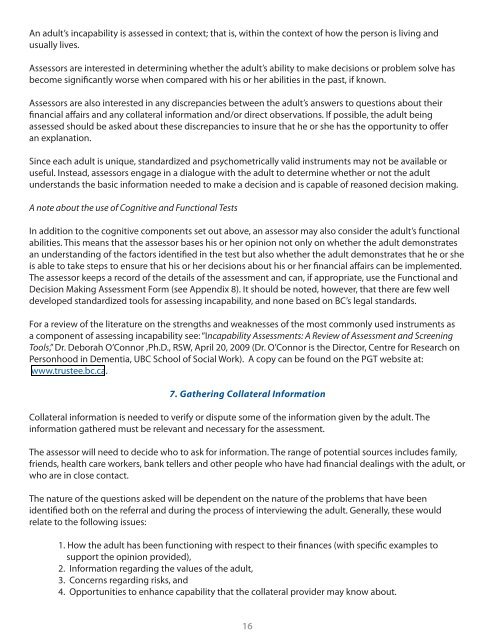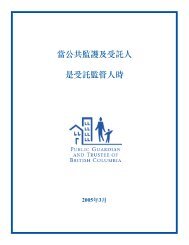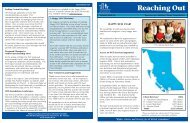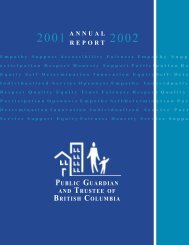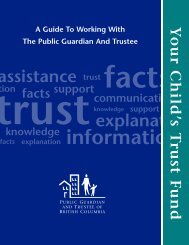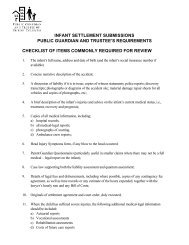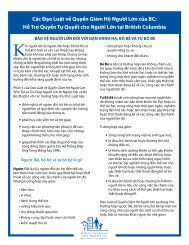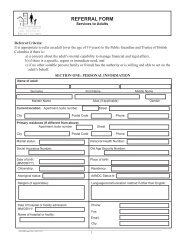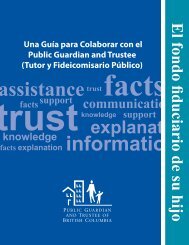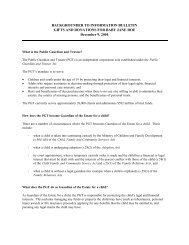Guidelines for Issuing a Certificate of Incapability under the Patients ...
Guidelines for Issuing a Certificate of Incapability under the Patients ...
Guidelines for Issuing a Certificate of Incapability under the Patients ...
Create successful ePaper yourself
Turn your PDF publications into a flip-book with our unique Google optimized e-Paper software.
An adult’s incapability is assessed in context; that is, within <strong>the</strong> context <strong>of</strong> how <strong>the</strong> person is living and<br />
usually lives.<br />
Assessors are interested in determining whe<strong>the</strong>r <strong>the</strong> adult’s ability to make decisions or problem solve has<br />
become significantly worse when compared with his or her abilities in <strong>the</strong> past, if known.<br />
Assessors are also interested in any discrepancies between <strong>the</strong> adult’s answers to questions about <strong>the</strong>ir<br />
financial affairs and any collateral in<strong>for</strong>mation and/or direct observations. If possible, <strong>the</strong> adult being<br />
assessed should be asked about <strong>the</strong>se discrepancies to insure that he or she has <strong>the</strong> opportunity to <strong>of</strong>fer<br />
an explanation.<br />
Since each adult is unique, standardized and psychometrically valid instruments may not be available or<br />
useful. Instead, assessors engage in a dialogue with <strong>the</strong> adult to determine whe<strong>the</strong>r or not <strong>the</strong> adult<br />
<strong>under</strong>stands <strong>the</strong> basic in<strong>for</strong>mation needed to make a decision and is capable <strong>of</strong> reasoned decision making.<br />
A note about <strong>the</strong> use <strong>of</strong> Cognitive and Functional Tests<br />
In addition to <strong>the</strong> cognitive components set out above, an assessor may also consider <strong>the</strong> adult’s functional<br />
abilities. This means that <strong>the</strong> assessor bases his or her opinion not only on whe<strong>the</strong>r <strong>the</strong> adult demonstrates<br />
an <strong>under</strong>standing <strong>of</strong> <strong>the</strong> factors identified in <strong>the</strong> test but also whe<strong>the</strong>r <strong>the</strong> adult demonstrates that he or she<br />
is able to take steps to ensure that his or her decisions about his or her financial affairs can be implemented.<br />
The assessor keeps a record <strong>of</strong> <strong>the</strong> details <strong>of</strong> <strong>the</strong> assessment and can, if appropriate, use <strong>the</strong> Functional and<br />
Decision Making Assessment Form (see Appendix 8). It should be noted, however, that <strong>the</strong>re are few well<br />
developed standardized tools <strong>for</strong> assessing incapability, and none based on BC’s legal standards.<br />
For a review <strong>of</strong> <strong>the</strong> literature on <strong>the</strong> strengths and weaknesses <strong>of</strong> <strong>the</strong> most commonly used instruments as<br />
a component <strong>of</strong> assessing incapability see: “<strong>Incapability</strong> Assessments: A Review <strong>of</strong> Assessment and Screening<br />
Tools,” Dr. Deborah O’Connor ,Ph.D., RSW, April 20, 2009 (Dr. O’Connor is <strong>the</strong> Director, Centre <strong>for</strong> Research on<br />
Personhood in Dementia, UBC School <strong>of</strong> Social Work). A copy can be found on <strong>the</strong> PGT website at:<br />
www.trustee.bc.ca.<br />
7. Ga<strong>the</strong>ring Collateral In<strong>for</strong>mation<br />
Collateral in<strong>for</strong>mation is needed to verify or dispute some <strong>of</strong> <strong>the</strong> in<strong>for</strong>mation given by <strong>the</strong> adult. The<br />
in<strong>for</strong>mation ga<strong>the</strong>red must be relevant and necessary <strong>for</strong> <strong>the</strong> assessment.<br />
The assessor will need to decide who to ask <strong>for</strong> in<strong>for</strong>mation. The range <strong>of</strong> potential sources includes family,<br />
friends, health care workers, bank tellers and o<strong>the</strong>r people who have had financial dealings with <strong>the</strong> adult, or<br />
who are in close contact.<br />
The nature <strong>of</strong> <strong>the</strong> questions asked will be dependent on <strong>the</strong> nature <strong>of</strong> <strong>the</strong> problems that have been<br />
identified both on <strong>the</strong> referral and during <strong>the</strong> process <strong>of</strong> interviewing <strong>the</strong> adult. Generally, <strong>the</strong>se would<br />
relate to <strong>the</strong> following issues:<br />
1. How <strong>the</strong> adult has been functioning with respect to <strong>the</strong>ir finances (with specific examples to<br />
support <strong>the</strong> opinion provided),<br />
2. In<strong>for</strong>mation regarding <strong>the</strong> values <strong>of</strong> <strong>the</strong> adult,<br />
3. Concerns regarding risks, and<br />
4. Opportunities to enhance capability that <strong>the</strong> collateral provider may know about.<br />
16


